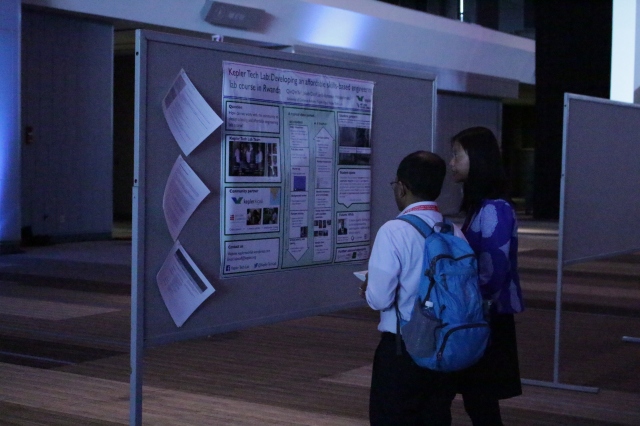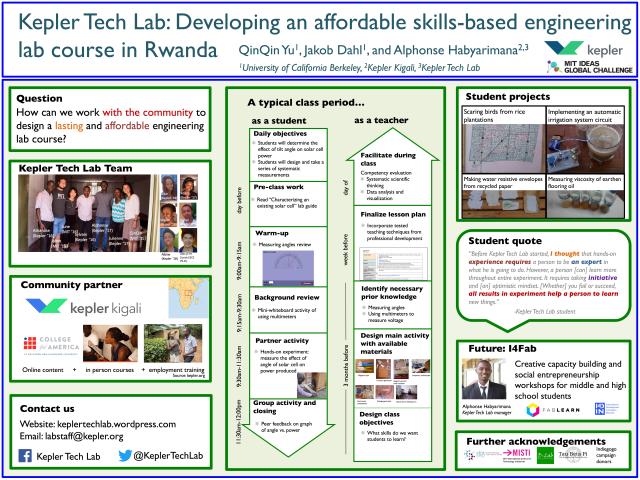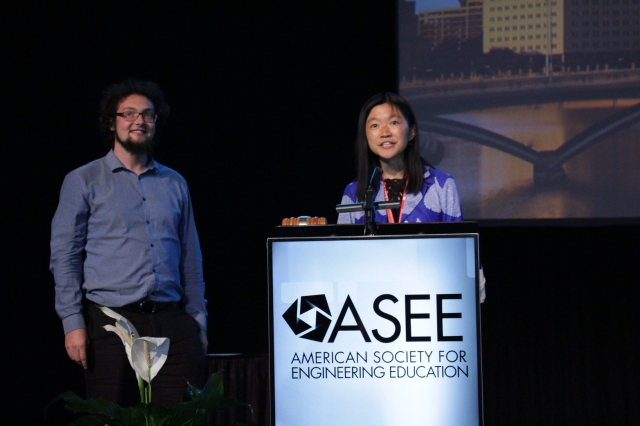
Last week, Kepler Tech Lab (now I4Fab) had the opportunity to present our work at the annual American Society of Engineering Education (ASEE) conference in Columbus, Ohio, USA. The conference attracted over 4000 engineering education researchers and educators from around the world for 4 days of talks, poster presentations, and networking sessions. It is the single biggest event every year that brings together people working in engineering education in North America and around the world, and we were excited to be able to talk to the attendees about Kepler Tech Lab.
Unfortunately, Alphonse was not able to make it because of the long journey across the Atlantic, but Jakob and I had the pleasure of representing him and the work of the lab. We presented a paper, titled Kepler Tech Lab: Developing an affordable skills-based engineering lab course in Rwanda at the International Forum, which is an event affiliated with the main conference. You can download our paper here and presentation here. We also presented a poster at the President’s Farewell Reception on Wednesday night.

Our audience at the International Forum was primarily composed of engineering educators at various universities across the world (Hong Kong Polytechnic University, Aalborg University in Denmark, University of Rhode Island, Virginia Polytechnic Institute, and others) who were interested in evaluating the effectiveness of the internationally-relevant engineering courses, programs, or collaborations. While most of the audience members were professors working on established programs in internationally-recognized universities, Kepler Tech Lab was one of the few projects that was spearheaded by students in a low-resource setting. We were very proud to talk about that aspect of it!
The conference provided a good opportunity for us to learn about the formal educational research methods that are used to evaluate effectiveness of engineering programs, which will also be important for formally evaluating Kepler Tech Lab’s work in the future. Some common methods that educators and education researchers use are:
- Interviewing subjects (students, professors, community stakeholders) with tailored questions and categorizing their responses
- Asking subjects to reflect on their experiences before and after an education intervention (through survey questions, journals, etc.) on:
- Their perception of learning
- Their satisfaction with learning
- For educational initiatives with an international component, assessing subjects’ cultural competencies before and after an intervention
- Comparing learning outcomes with internationally-recognized engineering program accreditation standards
These methods are not exclusive, and many researchers mix and match multiple methods to understand the educational experience from multiple perspectives. Some researchers may also choose to follow a group of subjects through time, which gives them more in-depth evidence of how engineering programs may have had an impact.
The most popular method that was used between the presentations was interviews, and when I asked researchers why they chose that method, they repeatedly responded that it was the best way to get deep information about each individual subject’s thoughts and reactions. While in principle you could get the same information from a pre-written survey, they said, you would need an infinite number of questions to capture the intricate details that differentiate each subject’s experiences and perceptions. It’s so much easier to be able to probe a subject’s thoughts in the moment with a good interview question.

We also learned about new initiatives in makerspaces, which is a direction that Kepler Tech Lab/I4Fab is interested in exploring for the future. I specifically really liked Jewell Brey’s presentation on the Maker in Residence program at University of Chapel Hill’s Be A Maker makerspace. The student-run program invites local makers (engineers, artists, scientists) to host a series of 5 “build” sessions on a project in their area of expertise. The projects ranged from building a telescope to see spots on the moon to designing their own electronic musical instrument circuits using shapes made from graphite on paper. Other educators and researchers at the conference emphasized the importance of using the skills of the people in the local community when first starting a makerspace. It not only results in well-taught and fun workshops, but it helps to build local stakeholders.
We met a surprisingly large number of people who were in some way affiliated with current or future engineering education projects in East Africa. Professor Kenneth Connor and colleagues at Rensselaer Polytechnic University are adapting their low-cost mobile labs project to an international development context in sub-Saharan Africa. A group of students and staff at the University of San Diego will potentially begin working with a secondary school in southern Rwanda on a drone-engineering education program in light of Zipline’s new drone deliveries in Rwanda. The Engineers Without Borders chapter at University of Auburn is working with a secondary school in Ngorero, Rwanda to design and implement a rain water catchment system. Photographs of Rwandan markets taken by interns at the Land O’Lakes’ Global Food Challenge program (which focuses on agricultural systems in East Africa) were featured in Resource, a magazine of American Society of Agricultural and Biological Engineers. We certainly were not expecting to meet that many people with a connection to Rwanda or East Africa!
We also ran into Eric Reynolds, a former MIT D-Lab instructor who hosted Alphonse at the FabLearn conference in Stanford last October!
Thank you to Sophi Martin, Kate Boden, Kweku Opoku-Agyemang, and Brendan Folie at University of California – Berkeley for valuable feedback on our presentation. Thank you to the University of California – Berkeley conference travel grant for generous funding for us to be able to attend the conference.
The ASEE conference was a great opportunity for us to record and share the work that we had done as concrete deliverables, and to learn from and network with leading engineering educators and researchers around the world. We’re looking forward to more opportunities to share our work with a local and global audience in upcoming conferences. Stay tuned for more blog posts!

Well done QinQin & Jacob! This is a nice presentation.
LikeLike